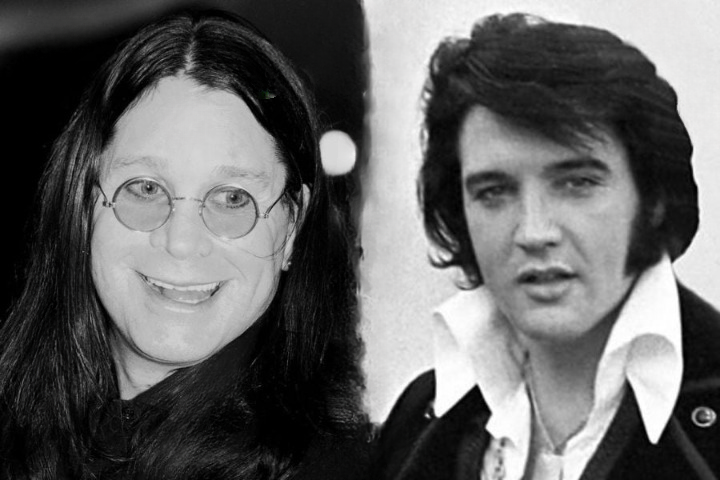NEW YORK, NY — December 1975
On a winter evening at Madison Square Garden, Elvis Presley found himself in an unusual position—not as the headliner, but as a spectator. Still drawing massive crowds in Las Vegas and across the country, the King of Rock and Roll stood backstage, sunglasses on, quietly observing as Black Sabbath, led by Ozzy Osbourne, delivered their powerful performance to thousands of fans.
For Elvis, the moment was more than entertainment. It was a reminder of the raw energy and authenticity that had once defined his own career. In the mid-1970s, Elvis remained an icon, but behind the scenes he was struggling. Years of demanding tours, the pressures of fame, and reliance on prescription medication had taken a toll. Though his voice could still fill an arena, he felt the spark that once made him revolutionary beginning to fade.
Backstage, as he listened to Ozzy’s unfiltered vocals and the band’s heavy sound, Elvis reflected on his own journey. In the 1950s, his music had shocked audiences, challenged conventions, and inspired a generation. But now, he questioned whether he had lost that edge. Watching Black Sabbath reminded him of what it meant to be bold, real, and unapologetically true to the music.
It wasn’t envy or bitterness that Elvis felt—it was recognition. The daring edge that had once defined him had faded, replaced by the routine and security of repeated performances. Between contracts, tours, and the pressures of stardom, Elvis the artist had begun to recede behind Elvis the icon.
An Unexpected Encounter
Backstage, Ozzy Osbourne was surprised to find Elvis quietly observing. Witnesses recall their brief but meaningful conversation: Elvis praised the raw intensity of Black Sabbath’s performance, while Ozzy admitted that Elvis had inspired his own music. They spoke not as legends, but as artists who understood the demands of fame and the drive for authenticity. Ozzy later remembered Elvis saying, “Keep doing what you’re doing. Don’t let them tame you.”
For Elvis, Ozzy’s unfiltered energy was a reminder of music’s true purpose—an honest connection between artist and listener. It awakened a desire to reconnect with the raw creativity that had fueled his early career, along with a fear that he might have left it behind.
Private Reflection at Graceland
Back at Graceland, Elvis retreated to his music room, surrounded by instruments that evoked memories of his younger, freer self. He played gospel tunes and revisited the rhythm and blues that had first set him apart. In these private moments, he reconnected with the authenticity that had made him revolutionary.
Yet the Las Vegas residencies, while financially rewarding, had become a double-edged sword. Every show demanded the same hits and polished routines, replacing the risk and spontaneity that once defined his performances. The applause was still loud, but inside, Elvis questioned whether it was for him—or for the memory of who he had been.
The Cost of Fame
Colonel Tom Parker, Elvis Presley’s longtime manager, was a master of business strategy. He ensured Elvis kept performing, that audiences kept coming, and that revenue continued to flow. But that stability came at a price. Innovation was limited, risks were minimized, and for years, Parker insisted that fans wanted Elvis unchanged—the eternal king they remembered.
Elvis understood there was more to it. What audiences truly sought wasn’t repetition—it was connection. And connection required honesty, something he felt slipping away.
Nights at Graceland often became restless as Elvis wrestled with these thoughts. He turned to his gospel records, revisiting the music that had always grounded him. Playing those songs reminded him of his early days at Sun Records, when performing meant pouring everything into the sound. The uncertainty then had been frightening, yet liberating; the predictable routine of Las Vegas now felt suffocating.
Prescription medications dulled some of the discomfort but never answered the deeper questions. They left him caught between fatigue and alertness, painfully aware that something essential had been lost.
Elvis at the Piano: The Man Behind the Legend
In the quiet hours, after the crowds had left and the lights dimmed, Elvis would sit at his piano—a polished yet well-worn companion. Friends recall him spending long nights alone, playing gospel hymns, spirituals, and the ballads that shaped his youth. These sessions weren’t for an audience; they were private moments of reflection, almost like confessions through music.
One friend remembered hearing him sing late at night, his voice raw and emotional, performing songs like “Unchained Melody” with a depth that surpassed any stage show. In those private moments, he wasn’t the superstar—he was a man seeking meaning. He confessed the toll of fame and routine, saying, “I don’t want to just sing songs. I want to mean them.”
